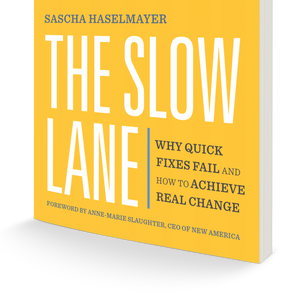"He who rushes ahead, doesn’t go far." Lao Tzu from the Tao Te Ching, 6th century BC
London, 2014. I am strolling up the Caledonian Road, or ‘The Cally’ as locals lovingly call it. As I leave London’s futuristic Kings Cross Station behind, small boarding houses, betting shops, letting agents, fish’n’chips shops, off licenses, kebab shops, vegetable stores and community pubs take turns along the streetscape. I cross a canal lined by trees. Walking up The Cally is like traveling back to a time when Central London still had working class neighborhoods. It has always been awkwardly both central and undesirable at the same time. People live in apartments above the small shops, public housing from all kinds of periods, terraced homes. And then, an abrupt change. After about a mile huge walls emerge from between the small homes. Three stories of solid brickwork, a barrier almost a mile long, topped by barbed wire. A dystopian Victorian fortress. Even if you live right next to it, it is impossible to know what exactly happens behind these walls. I have arrived at my destination.
Pentonville Prison has been largely unchanged since 1842, when it was built to house five hundred prisoners who were awaiting deportation and held in isolation. The prison has always been notorious, feeding scandalous headlines. Most recently it made the news for murder, crumbling cells, overcrowded conditions for its 1,300 prisoners and a scandal involving drones delivering drugs to inmates from the air. As I walk in, the entrance area feels weirdly like a small-town police station. But even as a visitor I feel like I am leaving a piece of myself behind with every door and gate we pass. Everything I carry goes into a small locker. My phone, keys, wallet, camera, passport. I can’t help feeling powerless. Do I need to watch what I say? What if they were to just keep me in here?
A warden leads us through a common area surrounded by cells to our destination, an ordinary meeting room set with tables, coffee and a few snacks. My excitement had grown for some time as I anticipated the meeting that was about to take place here. Kevin Reilly, known as the No 1 governor and the top official in charge of running the prison, would soon meet with prisoner representatives to hear their ideas for improvements to prison life. For Pentonville Prison, this is a big deal. For weeks, prisoners had run an election to select their representatives who in turn had prepared a list of ideas for improvement to present to the governor today. We were here to attend the Prison Council, the first such meeting in the 170 year history of Pentonville Prison.
Humility had brought Kevin Reilly to the table. Cuts to government budgets, the result of years of austerity after the 2007/8 financial crisis, meant that he didn’t have enough money to run the prison properly for some time now. People who in the past might have accepted a job working in the prison now find more attractive jobs in other, better funded areas of public safety. He has trouble filling his job openings. Short of funds and staff he can’t keep his facilities in good enough shape, or provide all that is needed to treat prisoners in a humane way. All this makes the prison more dangerous. Rising tensions cause more problems for him, including scandalous headlines. It is a vicious circle that he hopes to break by chairing the Prison Council today. He comes to give them a say in how his scarce resources should be used.
None of us would be in this room today if it hadn’t been for User Voice, a non-profit from London. They had come up with the idea of the Prison Council. Pentonville was only the latest in a growing list of prisons that had set up Prison Councils across the country. User Voice helps the prison system by collecting high-quality feedback from prisoners to improve conditions. Better conditions mean that prisoners can focus on preparing for life after prison. Before Mark Johnson founded User Voice he had lived many of the experiences shared by prisoners in Pentonville. In ‘Wasted’, a book about his childhood, youth and early adulthood he recalls his tragic and complicated story of surviving violent domestic abuse as a child and then slipping into crime and addiction. For years Mark lived homeless on the streets of central London, feeding a $600 per day heroin addiction. Mark had been in- and out of prison himself and after a long struggle broke free from addiction and crime. He soon discovered his hidden potential by building award-winning businesses. But he found his true calling when in 2008 he started User Voice to help others have a fair chance as they struggle on their journey to rehabilitation.
Over coffee, I ask Joe from User Voice about what it took to make this Prison Council happen. “It took forever. We have tried for years to set up a Prison Council here. But Kevin and the current prison management finally gave us the green light.” Changing things in government is hard. It must be harder still in a prison. “We at User Voice are all ex-offenders. I’ve done time myself. It takes open minded people like Kevin to let us run a program like this.” Joe nods in the direction of the prisoner representatives. “It is a bit of an art to recruit the right people to stand for election. People with authority make the best candidates, people will not vote otherwise. Those are the tough guys, you know, with long sentences. Everyone listens to them.”
Kevin Reilly enters the room now filled with anticipation, a huge key chain dangling from his belt. Joe and his team jump into action, ushering everyone to their seats at the table. The prisoners for their part look nervous. One of them, Ray, had told me earlier that he wanted to do right by the other prisoners who had entrusted this mission to them. Reilly reminds the group of the rules for this meeting. I notice his body language, he looks relaxed. After a round of introductions it is Ray’s turn to present his request. “Many of the phones in the common areas are broken. We get long queues and people start worrying that they might miss their turn. We want to call family, girlfriends, lawyers. It is important to us. Fights break out all the time over how long someone speaks on the phone. We end up hurting one another.” Reilly repeats the request in his own words, promising to duly consider each request before the next session. Just before Ray is led out of the room I ask him how it went. “I didn’t mess up. I feel heard, I feel respected. Let’s hope the governor gets some things done.”
As I make my way back down The Cally, I cannot help but admire the genius of User Voice. It is one thing to figure that the governor and prisoners should talk. But as ex-offenders they also knew how hard it would be to actually have this conversation. Mark knew from experience how intimidating it is for prisoners to speak to the authorities. Probation officers, prison wardens, governors or judges wield enormous power over their lives. And the stakes are even higher when addiction, mental health, money and family problems come into play. Fearing repercussions, prisoners and ex-offenders often stay quiet even if they need help. And without their participation, the authorities have too little information to help their rehabilitation process. It is a vicious circle marked by fear and distrust that frustrates everyone. User Voice filled a need no one else saw. And independent evaluations proved that it works. Prisoners across the UK open up to the people at User Voice who have lived through similar experiences. In 2009, when Mark Johnson founded the organization, no one had ever involved users of the probation services to improve outcomes. In just the period of 2015-21 User Voice has helped 127,000 ex-offenders take an active role in their probation by giving them a voice. They have recruited and trained more than 1,400 elected representatives to prison councils across the country, where they developed four hundred service improvements. Ninety percent of officials agreed that this empowerment had benefited probation outcomes.



